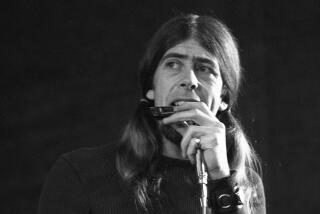Ornette Coleman “Free Jazz” (1961)<i> Atlantic</i>
- Share via
This album--from which an entire movement in jazz drew its name--was so unprecedented and against-the-grain that it remains controversial more than 30 years after its release. Like John Coltrane, Miles Davis and Charlie Parker, alto sax player Coleman shattered existing notions of what jazz was and is, and it spawned vociferously opposing camps of idolaters and detractors. For this session, he assembled a “double quartet,” two groups that played simultaneously (one can be heard on the left stereo channel, the other on the right).
The musicians--including trumpeters Don Cherry and Freddie Hubbard, bassist Charlie Had en and bass clarinetist Eric Dolphy, who laid down some of the most exciting work of his tragically brief career--played strictly from the feeling of the moment, disregarding such long-established foundations of jazz as melody, chord structure, even meter. The layers of sound that resulted are almost unbearably intense and confrontational, yet for all its lack of convention, the album can boast a profound sense of soul, a
harmonic poetry as the fiery elegance of the performances contradicts the anarchy bubbling at the surface.
With the passage of time, Coleman’s vision has come to be accepted as legitimate among many jazz scholars, but there remains a school of traditionalists who will never forgive him for the havoc he wrought, the barriers he broke, with this album.
More to Read
The biggest entertainment stories
Get our big stories about Hollywood, film, television, music, arts, culture and more right in your inbox as soon as they publish.
You may occasionally receive promotional content from the Los Angeles Times.










